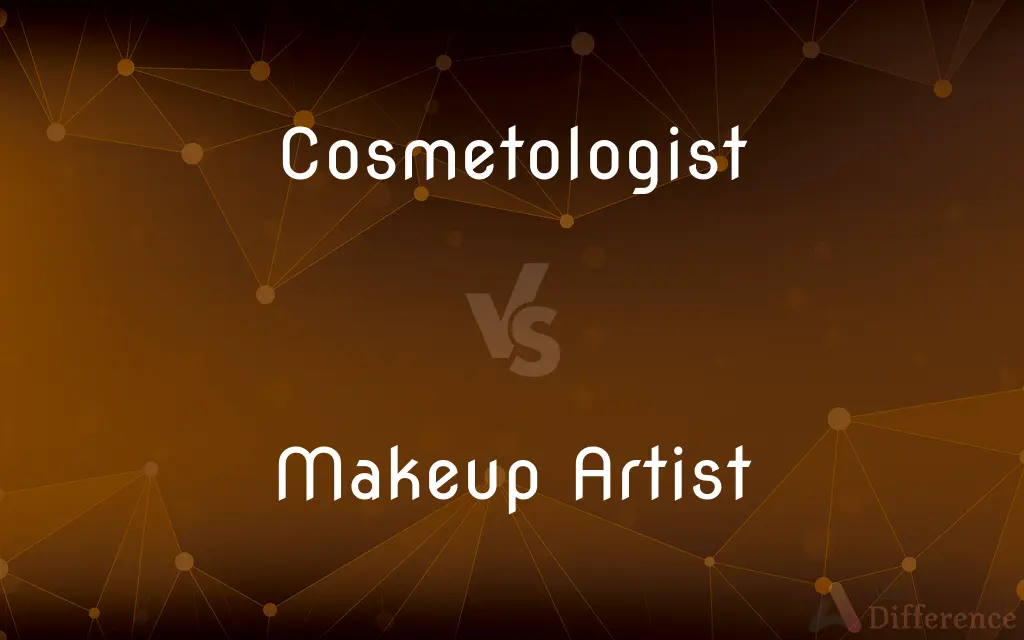Cosmetologist vs. Makeup Artist — What's the Difference?
Edited by Tayyaba Rehman — By Urooj Arif — Published on February 23, 2024
A cosmetologist is trained in various beauty treatments, while a makeup artist specializes in applying makeup to enhance or alter appearance.

Difference Between Cosmetologist and Makeup Artist
Table of Contents
ADVERTISEMENT
Key Differences
Cosmetologists and makeup artists both operate in the beauty industry but cater to different aspects of personal aesthetics. In contrast, makeup artists focus specifically on makeup application to enhance, alter, or beautify an individual's appearance for events, photography, film, and theater.
Cosmetologists are professionals who have undergone extensive training to offer a wide range of beauty services, including hair cutting, styling, coloring, skincare, nail treatments, and makeup application. While Makeup artists may specialize in various fields, including bridal, fashion, special effects, and prosthetic makeup. While some makeup artists pursue formal education through beauty schools or workshops, others develop their skills through self-study and practical experience.
Cosmetologists offer a broader range of beauty services and must adhere to state licensure requirements, reflecting their comprehensive training. Meanwhile, makeup artists, though they may not need a license depending on their location and the services they offer, often pursue specialized training to master their craft. The choice between visiting a cosmetologist or a makeup artist depends on the client's needs—whether they require comprehensive beauty services or specialized makeup artistry for a particular occasion.
The industry scope for both professions can vary; cosmetologists may find opportunities in more traditional beauty settings, while makeup artists often work in more diverse environments, including fashion shows, movie sets, private events, and personal consulting. Despite their differences, both play crucial roles in enhancing personal appearance and confidence, contributing significantly to the beauty and entertainment industries.
Comparison Chart
Training
Broad, covering hair, skin, nails, and makeup.
Specialized in makeup techniques and products.
ADVERTISEMENT
Licensure
Required in most regions; involves comprehensive exams.
Often varies by location; not always required.
Services Offered
Wide range including hair styling, skincare, and nails.
Primarily focuses on makeup application.
Employment Settings
Salons, spas, beauty schools.
Film, television, fashion, weddings, private events.
Specializations
Can specialize in one or more beauty services.
May focus on areas like special effects or bridal makeup.
Education Path
State-licensed cosmetology programs.
Workshops, beauty schools, self-taught experience.
Professional Focus
General beauty and personal care.
Enhancing or altering appearance through makeup.
Client Interaction
Broad services require diverse client engagement.
Focused on makeup consultations and applications.
Compare with Definitions
Cosmetologist
A licensed professional in beauty treatments.
The cosmetologist provided a complete makeover, including hair, nails, and makeup.
Makeup Artist
Enhances features for specific events.
The makeup artist is skilled at creating looks for both daytime events and glamorous evenings.
Cosmetologist
Offers a range of beauty services.
As a cosmetologist, she specializes in both skincare and hairstyling.
Makeup Artist
May not require licensure.
As a freelance makeup artist, she built her career through self-taught skills and workshops.
Cosmetologist
Works in various beauty settings.
She works as a cosmetologist at a high-end salon and spa.
Makeup Artist
Specializes in makeup application.
The makeup artist created a stunning look for the bride.
Cosmetologist
Requires formal education and licensure.
He completed a two-year cosmetology program to become licensed.
Makeup Artist
Focuses on artistic makeup techniques.
The artist specializes in special effects makeup for films.
Cosmetologist
Adapts to evolving beauty trends.
The cosmetologist attends workshops to keep up with the latest beauty techniques.
Makeup Artist
Works across entertainment and fashion.
He's a renowned makeup artist in the fashion industry.
Cosmetologist
An expert in the use of cosmetics
Cosmetologist
The study or art of cosmetics and their use.
Cosmetologist
A person who advises people (normally women) on cosmetics and other beauty treatments; a beautician.
Common Curiosities
Can a cosmetologist work as a makeup artist?
Yes, cosmetologists can work as makeup artists if their training included makeup application, and they are skilled in that area.
What kind of training is required to become a cosmetologist?
Cosmetologists typically complete a state-licensed cosmetology program that includes both theoretical study and practical experience.
What is the main difference between a cosmetologist and a makeup artist?
A cosmetologist provides a range of beauty services including hair, nails, and makeup, while a makeup artist specializes in makeup application.
Where do makeup artists typically work?
Makeup artists often work in diverse environments, including fashion shows, weddings, film and television sets, and personal consulting.
Is it better to go to a cosmetologist or a makeup artist for wedding makeup?
It depends on the individual's needs; a makeup artist might be preferred for specialized bridal makeup, while a cosmetologist could provide additional services like hair and nails.
How do cosmetologists and makeup artists stay updated with trends?
Both professionals may attend workshops, trade shows, and continue education courses to stay current with the latest trends and techniques.
Do you need a license to be a makeup artist?
Licensing requirements for makeup artists vary by location and type of service provided; not all types of makeup artistry require a license.
What are the career prospects for cosmetologists and makeup artists?
Both fields offer diverse career opportunities, with cosmetologists working in beauty salons and spas, and makeup artists in entertainment, fashion, and as freelancers.
Can makeup artists create special effects makeup?
Yes, some makeup artists specialize in special effects makeup, creating looks for movies, theater, and Halloween.
How important is creativity in these professions?
Creativity is crucial for both cosmetologists and makeup artists, as it drives innovation and the ability to create personalized looks for clients.
Share Your Discovery

Previous Comparison
Jenny Craig vs. Nutrisystem
Next Comparison
Adjunct Professor vs. Associate ProfessorAuthor Spotlight
Written by
Urooj ArifUrooj is a skilled content writer at Ask Difference, known for her exceptional ability to simplify complex topics into engaging and informative content. With a passion for research and a flair for clear, concise writing, she consistently delivers articles that resonate with our diverse audience.
Edited by
Tayyaba RehmanTayyaba Rehman is a distinguished writer, currently serving as a primary contributor to askdifference.com. As a researcher in semantics and etymology, Tayyaba's passion for the complexity of languages and their distinctions has found a perfect home on the platform. Tayyaba delves into the intricacies of language, distinguishing between commonly confused words and phrases, thereby providing clarity for readers worldwide.
















































